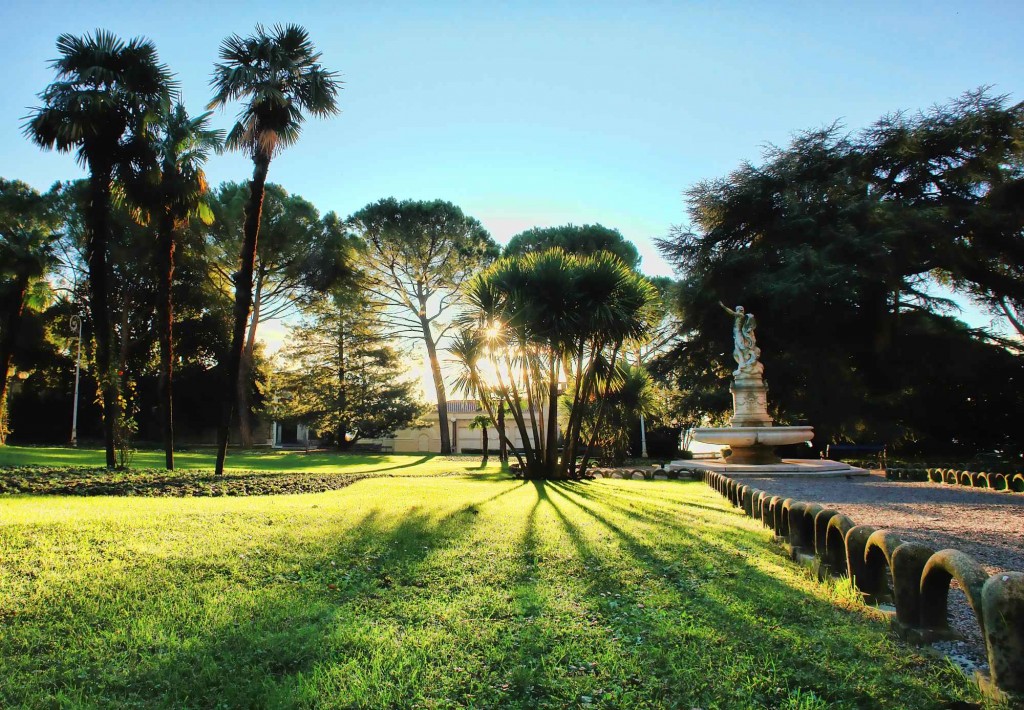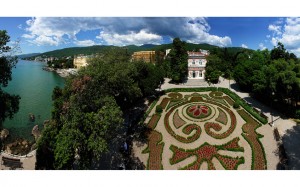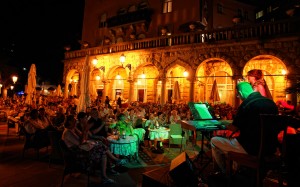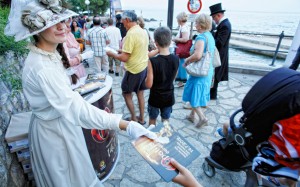Raspoloživost
Za sve informacije molimo obratite nam se telefonom +385/51/343-059 ili e-mailom na info@topadria.hr
Opis
Hotel Agava
The Hotel Agava is situated in a wonderful old villa in the centre of Opatija in the immediate vicinity of the Angiolina Park with a magnificent view of Kvarner Bay. The former Villa Habsburg was built in 1896 and was refurbished as the Hotel Agava in 2006. The overall experience of the hotel is rounded off by beautifully manicured gardens with carefully chosen citrus trees and typical flowers of the area. The hotel has 76 stylish rooms with air-conditioning that meet the Standard category. The hotel restaurant Agava offers a wide range of specialities of Croatian cuisine, and for relaxation after dinner there is the pleasant ambience of the hotel terrace alongside Opatija’s main street. Hotel guests also have at their disposal the wellness centre of the Grand Hotel 4 Opatijska Cvijeta with its large outdoor and indoor pool, saunas, Jacuzzi, treatment rooms, and fitness centre.
Single room
Room service
Loundry service
Air condition
Private bathroom & toilette
Hair drier
Mini bar
Safe deposit box in room
TV
Satellite TV
Direct dial phone
Double room
Room service
Loundry service
Baby cot possible
Air condition
Private bathroom & toilette
Hair drier
Mini bar
Safe deposit box in room
TV
Satellite TV
Direct dial phone
Internet access
Romantic double room
Sea view
Balcony
Air condition
Private bathroom & toilette
Hair drier
Mini bar
Safe deposit box in room
TV
Satellite TV
Pay TV
Direct dial phone
Internet access
Wi-Fi
Bath robe
For more information and reservations you can contact us on +385 (0)51 343 059 or send mail.
Check-in
Check-out
Opremljenost
- Air Conditioning
- Balcony
- Bath
- Hairdryer
- Heating
- SAT-TV
- Seaview
- Wi-Fi
Opatija

Opatija
Opatija, this elegant tourist destination, lies at the centre of the Riviera with the longest tradition of tourism in Croatia. The very attractive geographic position, enabling its warm seas to be quickly reached from many cities in Central Europe (only about 500 km from Milan, Vienna and Münich), lush green scenery and a pleasant climate (45° 20’ north latitude) were some of the main reasons for its beginning and the quick development of its tourism at the end of the 19th century.Built mainly at the turn of the 20th century, Opatija has remained in complete harmony with Nature right up until the present day. Well-maintained public gardens, the illuminated 12-km-long coastal promenade known as the “Lungomare”, well-kept beaches and fountains provide a stunning backdrop for the villas and hotels that cater comfortably for up to 6,000 guests.
Due to a relatively constant temperature (winter average 7.0 °C, summer average 21.9 °C), high air pressure and constant circulation of air, the climate in Opatija is relaxing and refreshing. The contrasts of sea and mountains, green parks and blue ocean, old buildings and modern comforts, noisy entertainment venues and quiet destinations for excursions all combine to make Opatija and its surroundings a very attractive tourist resort at any time of the year.
The tourist offering of Opatija includes its congress facilities (over 50 meeting rooms with capacity up to 900 delegates), 11 indoor swimming pools, wellness programmes, a casino, discotheques, a summer theatre with seating for 2,000, carnivals, festivals, and opportunities for shorter trips to nearby surroundings or all-day excursions to the Plitvice Lakes or Risnjak National Park, or even to Venice in Italy.
Sports & nature
 Climate – a moderate Mediterranean climate with mild winters and pleasant summers. Continuous circulation of air and sea aerosol.
The average air temperature in summer is 21.9 oC, and in winter 7 oC. The sea temperature in summer goes up to 26 oC.
The area averages 2,000 hours of sunshine a year.
Climate – a moderate Mediterranean climate with mild winters and pleasant summers. Continuous circulation of air and sea aerosol.
The average air temperature in summer is 21.9 oC, and in winter 7 oC. The sea temperature in summer goes up to 26 oC.
The area averages 2,000 hours of sunshine a year.Nightlife info
 Very interesting and intense.
Very interesting and intense.Culture and history info
 Opatija, often called the pearl of the Adriatic, is one of Croatia’s most famous destinations, boasting a tradition of welcoming visitors dating back more than 160 years.
Located at the edge of the Mediterranean, on the slopes of Mount Učka gently descending towards the coast of Kvarner Bay, Opatija with its local climate, beautiful architecture, quality hotels and luxurious, well-tended parks and promenades, offers plenty of possibilities for a pleasant stay throughout the year. The notable person who first discovered the magic of Opatija was Iginio Scarpa, a merchant from Rijeka who built his holiday home here in 1844 and named it the Villa Angiolina after his late wife. This event marked the beginning of tourism in Opatija.
After that, Opatija started intensely developing under the supervision of the Austro-Hungarian Empire.
Director of the Austrian Southern Railway Company Friedrich Schüler and its shareholders wanted to improve passenger traffic to the south. After choosing Opatija as the region’s most promising destination, they started building the first hotel in this new bathing and climatic health resort, advertising it widely as the “Austrian Nice”.
Several important facilities were built alongside the first hotel: a pavilion with indoor pool for warm sea baths, a bathing place with separate areas for ladies and gentlemen, and the 12-kilometre-long coastal promenade from Volosko to Opatija and further to Lovran.
The hotel was opened on the 27th March 1884. Its original name was Hotel Quarnero, and it offered its visitors 60 rooms.
The second hotel that was built in Opatija after the Quarnero was the Hotel Kronprinzessin Stephanie.
In 1885, the Austrian Southern Railway Company organised the first congress of balneologists in Opatija, during which the decision was made to declare Opatija a climatic health resort, which was officially done in 1889. Some of the Monarchy’s most eminent physicians opened their sanatoriums in Opatija; numerous promenades and bathing places were being built.
This all turned Opatija into one of Europe’s most important health resorts of the 19th and the first half of the 20th century, alongside Nice, Karlovy Vary, Cannes and Biarritz.
Kings and emperors, writers, philosophers, poets and composers used to stay here – let us mention some of them: the emperors Franz Joseph and William II, the queen of Romania Elisabeth who used to publish poems under the pseudonym of Carmen Sylva, then the empress Sissi, the writers A. P. Chekhov and James Joyce, the ballet dancer Isadora Duncan, and the composers Gustav Mahler and Giacomo Puccini. To see and be seen – this was the motto for those who came to Opatija.
After World War Two, Opatija’s tourism became more orientated to the summer season and the hosting of conventions. Throughout that whole period, Opatija retained its importance as a destination with something special to offer.
Opatija has numerous advantages that will surely entice you – superb convention facilities, quality accommodation, modern wellness centres for relaxation, and last but not least, friendly and professional staff that will do their best to meet all your requirements. Not to forget the area’s great gastronomy, offering unique combinations of traditional recipes, modern cuisine and first-class wines.
Opatija, often called the pearl of the Adriatic, is one of Croatia’s most famous destinations, boasting a tradition of welcoming visitors dating back more than 160 years.
Located at the edge of the Mediterranean, on the slopes of Mount Učka gently descending towards the coast of Kvarner Bay, Opatija with its local climate, beautiful architecture, quality hotels and luxurious, well-tended parks and promenades, offers plenty of possibilities for a pleasant stay throughout the year. The notable person who first discovered the magic of Opatija was Iginio Scarpa, a merchant from Rijeka who built his holiday home here in 1844 and named it the Villa Angiolina after his late wife. This event marked the beginning of tourism in Opatija.
After that, Opatija started intensely developing under the supervision of the Austro-Hungarian Empire.
Director of the Austrian Southern Railway Company Friedrich Schüler and its shareholders wanted to improve passenger traffic to the south. After choosing Opatija as the region’s most promising destination, they started building the first hotel in this new bathing and climatic health resort, advertising it widely as the “Austrian Nice”.
Several important facilities were built alongside the first hotel: a pavilion with indoor pool for warm sea baths, a bathing place with separate areas for ladies and gentlemen, and the 12-kilometre-long coastal promenade from Volosko to Opatija and further to Lovran.
The hotel was opened on the 27th March 1884. Its original name was Hotel Quarnero, and it offered its visitors 60 rooms.
The second hotel that was built in Opatija after the Quarnero was the Hotel Kronprinzessin Stephanie.
In 1885, the Austrian Southern Railway Company organised the first congress of balneologists in Opatija, during which the decision was made to declare Opatija a climatic health resort, which was officially done in 1889. Some of the Monarchy’s most eminent physicians opened their sanatoriums in Opatija; numerous promenades and bathing places were being built.
This all turned Opatija into one of Europe’s most important health resorts of the 19th and the first half of the 20th century, alongside Nice, Karlovy Vary, Cannes and Biarritz.
Kings and emperors, writers, philosophers, poets and composers used to stay here – let us mention some of them: the emperors Franz Joseph and William II, the queen of Romania Elisabeth who used to publish poems under the pseudonym of Carmen Sylva, then the empress Sissi, the writers A. P. Chekhov and James Joyce, the ballet dancer Isadora Duncan, and the composers Gustav Mahler and Giacomo Puccini. To see and be seen – this was the motto for those who came to Opatija.
After World War Two, Opatija’s tourism became more orientated to the summer season and the hosting of conventions. Throughout that whole period, Opatija retained its importance as a destination with something special to offer.
Opatija has numerous advantages that will surely entice you – superb convention facilities, quality accommodation, modern wellness centres for relaxation, and last but not least, friendly and professional staff that will do their best to meet all your requirements. Not to forget the area’s great gastronomy, offering unique combinations of traditional recipes, modern cuisine and first-class wines. Pročitaj više








